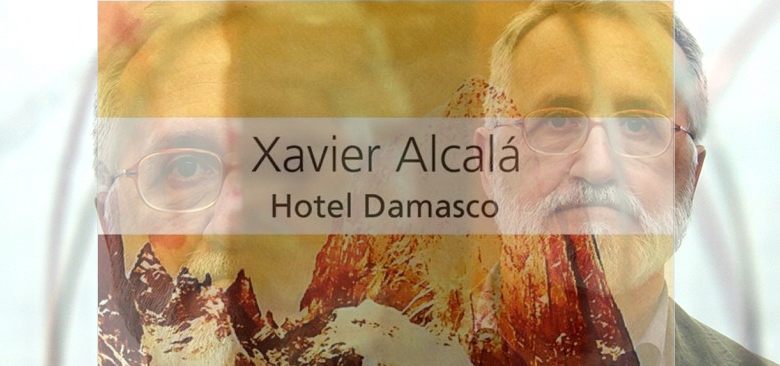Yusef Elías remained in charge of the store and Manuel Varela travelled to town in the wagon, sitting beside the reporter. The road seemed never-ending to Manuel, despite having such good company. Acuña was like an encyclopaedia: he knew everything about the history of his family and the circumstances that had obliged him to emigrate. He talked about Spain and Galicia just as Héctor spoke of his own country and region, with a self-assuredness that made it seem as if he had invented those lands himself, and all the people that lived in them.
Tag:
Xavier Alcalá
Yusef Elías the Turk, a travelling merchant, arrived at the store in the midst of a blinding snowstorm, in need of shelter from the weather. Varela and Julián helped him loose his horses in the corral and unload his wagon; and thus he became an unwilling guest with little hope of continuing on his journey home, way up north. The need to sell had compelled this weather-beaten man to venture further south than prudence recommended.
Old Pedro Moreno left with a list of requisitions and a bundle of letters. One letter was for Paulina, his words painting the beauty of the lands he had ventured to; another, for his teacher, confirmed the grandeur of the “Pre-Andean” hills, as the geographical treatise he had brought with him referred to them; and asking him to make sure Paulina Mouzo had everything she needed. In the last paragraph, Manuel informed the schoolteacher that Ibrahim was still in possession of the savings that the young widow’s husband had amassed with sweat and loneliness on the harsh desert roads.
The wagon departed, with a troop of spare horses behind. The weather was fair and all the spectacle and splendour that his teacher had described unfolded before Manuel: a world of flat topped hills, raw earth and sheets of water, green tints bordering the blue; brown earth once more; until white painted peaks like the ones in the sierras of San Fiz de Lamas rose slowly over the horizon.
On a morning like any other, sometime around Christmas, amidst a lot of sun and seagulls, a ship arrived carrying passengers and cargo. The usual tangled uproar took place, the little tugboat blowing smoke while it towed in the chatas, which were carrying all sorts of things on board: scared, crying children; extravagant consignments — including one upright piano; men who would not let go of their bags and demanded to be carried to dry land along with them; women coming to make the impossible possible in this male territory of oil-workers and shepherds.
When Manuel and his friend were well seasoned by the sun and the ocean winds, the ship finally reached a sea of red-brown water which the sailors on their ship called a river. On the shore there was a big port and cluster of long, tall buildings, with police, customs, health inspection and a “Hotel for Immigrants”.
Don Emeterio Suárez de Valcarría y Candia was a great huntsman, and an even better womaniser. It was well known throughout the region that, as soon as the season opened, he’d be up in the mountains, day after day, goaded on by the smell of gunpowder with not a thought in his head but feathers and hides and trophies.
Years went by, possibly some twenty, and the spinners of Soacinsa rarely crossed Don Emeterio’s mind. Vicente da Rula fell prey to a cancer that morphine could do little to mask; and the chemist heard no more about that child in the mountains except — from what his servant had told him — that he was growing up happily, with his loving mother and the kindly verger of San Fiz whom the woman had ended up marrying.
Don Emeterio Suárez de Valcarría y Candia was a great huntsman, and an even better womaniser. It was well known throughout the region that, as soon as the season opened, he’d be up in the mountains, day after day, goaded on by the smell of gunpowder with not a thought in his head but feathers and hides and trophies. There were times when he’d be marooned by heavy snowfall and not return home for weeks — not that his family worried much about that, for there were arrangements in place for these absences of the master of the house: his wife took charge of the household and their nine sons, and they had an assistant to look after the chemist shop where the locals would still gather in the back to play cards and dominoes, buoyed by comments and conjecture about the chemist’s carryings-on.
- 1
- 2


